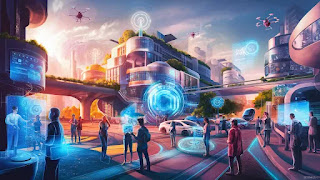Artificial intelligence (AI) is no longer a concept confined to science fiction or theoretical research. It has become a cornerstone of future technology, influencing and reshaping various aspects of our daily lives. From generative AI creating art to AI chatbots revolutionizing customer service, the transformative power of AI is both vast and profound. In this article, we will explore how AI is set to change our lives, the advancements in AI technology, and the pivotal roles played by leading AI companies.
The Current Landscape of Artificial Intelligence
Generative AI: Creativity Unleashed
Generative AI refers to systems that can create content, such as text, images, or music, by learning from vast datasets. These AI models, like OpenAI’s ChatGPT, can write articles, compose music, and even generate lifelike images. This technology is revolutionizing creative industries by automating content creation, thus saving time and resources while enabling new forms of artistic expression.
AI Chatbots: The New Face of Customer Service
AI chatbots have become ubiquitous on websites and social media platforms. They provide instant customer support, handle inquiries, and even process transactions. Companies like Google with its Google AI chatbot and OpenAI with ChatGPT are leading the charge. These AI chatbots online are not just limited to answering questions; they can engage in complex conversations, providing a seamless and personalized user experience.
Conversational AI: Bridging Communication Gaps
Conversational AI extends beyond simple chatbots. It involves sophisticated systems that understand and respond to human language in a natural and intuitive way. This technology is used in virtual assistants like Siri and Alexa, which can manage schedules, control smart home devices, and provide information. The development of conversational AI is transforming how we interact with technology, making it more accessible and user-friendly.
Future Technology: The Next Frontier of AI
Autonomous Systems: From Cars to Robots
One of the most exciting applications of future technology is the development of autonomous systems. Self-driving cars, for instance, use AI to navigate roads, recognize obstacles, and make split-second decisions. This technology promises to revolutionize transportation by reducing accidents and improving efficiency. Similarly, autonomous robots are being developed for various industries, from healthcare to manufacturing, where they can perform tasks with precision and consistency.
AI in Healthcare: Revolutionizing Diagnosis and Treatment
AI is making significant strides in healthcare by improving diagnostic accuracy and treatment outcomes. AI-powered systems can analyze medical images, predict disease outbreaks, and even suggest personalized treatment plans. Companies like IBM with Watson and Google Health are pioneering AI applications in medicine, which could lead to earlier diagnoses and more effective treatments, ultimately saving lives.
AI and Personalization: Tailoring Experiences
The ability of AI to analyze large amounts of data enables it to offer personalized experiences. For instance, AI algorithms can recommend products based on previous purchases, suggest movies or music based on viewing or listening habits, and even tailor educational content to individual learning styles. This level of personalization is enhancing user experiences across various domains, making interactions with technology more relevant and engaging.
AI Companies Leading the Charge
OpenAI: Pioneering AI Research
OpenAI is at the forefront of AI research and development. Its creation, ChatGPT, is a prime example of how far AI chatgpt has come in understanding and generating human-like text. OpenAI’s mission is to ensure that artificial general intelligence (AGI) benefits all of humanity. By developing cutting-edge AI models, OpenAI is setting new benchmarks in the field.
Google AI: Innovation and Integration
Google’s AI division is known for its innovations in machine learning and AI. The Google AI chatbot is part of its broader effort to integrate AI into everyday products and services. From search algorithms to smart home devices, Google’s AI technology is designed to enhance user experiences and streamline operations.
Emerging AI Startups: The New Players
In addition to established tech giants, numerous startups are making significant contributions to the AI landscape. These AI companies are focusing on niche areas such as AI ethics, healthcare applications, and autonomous systems. Their innovative approaches are driving the industry forward and expanding the possibilities of what AI can achieve.
The Ethical Considerations of AI
As AI continues to advance, it raises important ethical questions. Issues such as data privacy, algorithmic bias, and the impact of automation on jobs need to be addressed. Ensuring that AI is developed and deployed responsibly is crucial for its positive impact on society. Initiatives like AI ethics guidelines and transparent AI practices are essential for building trust and ensuring equitable benefits.
Conclusion: Embracing the AI Revolution
Artificial intelligence is set to transform our lives in ways we can hardly imagine. From enhancing creativity with generative ai to revolutionizing customer service with ai chatbot technology, the potential applications are endless. As AI technology continues to evolve, it will undoubtedly bring about significant changes across various sectors. By embracing these advancements and addressing the accompanying ethical considerations, we can harness the power of AI to create a better, more efficient, and more inclusive future.
Whether through openai chat, google ai chatbot, or other conversational ai systems, the future of AI promises to be as exciting as it is transformative. Keeping abreast of these developments and understanding their implications will be crucial for navigating the new AI-driven landscape.



